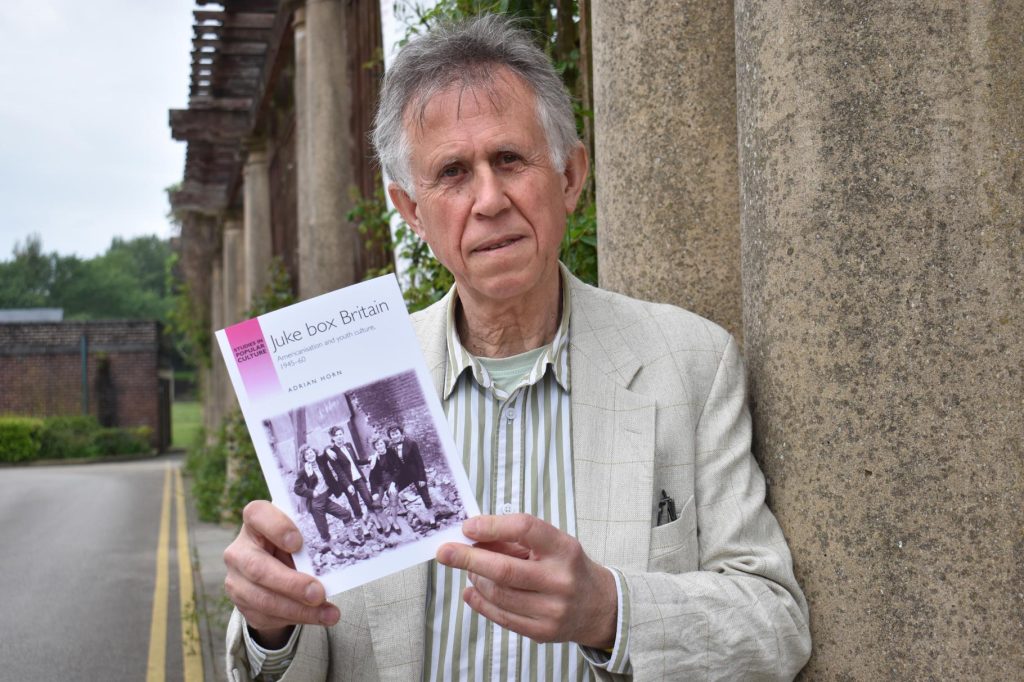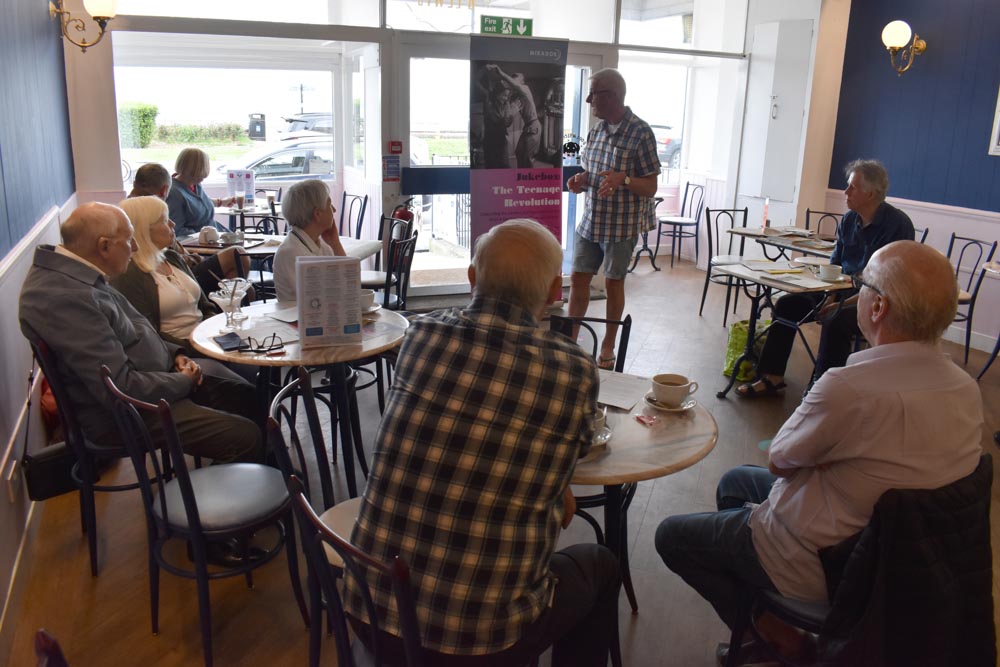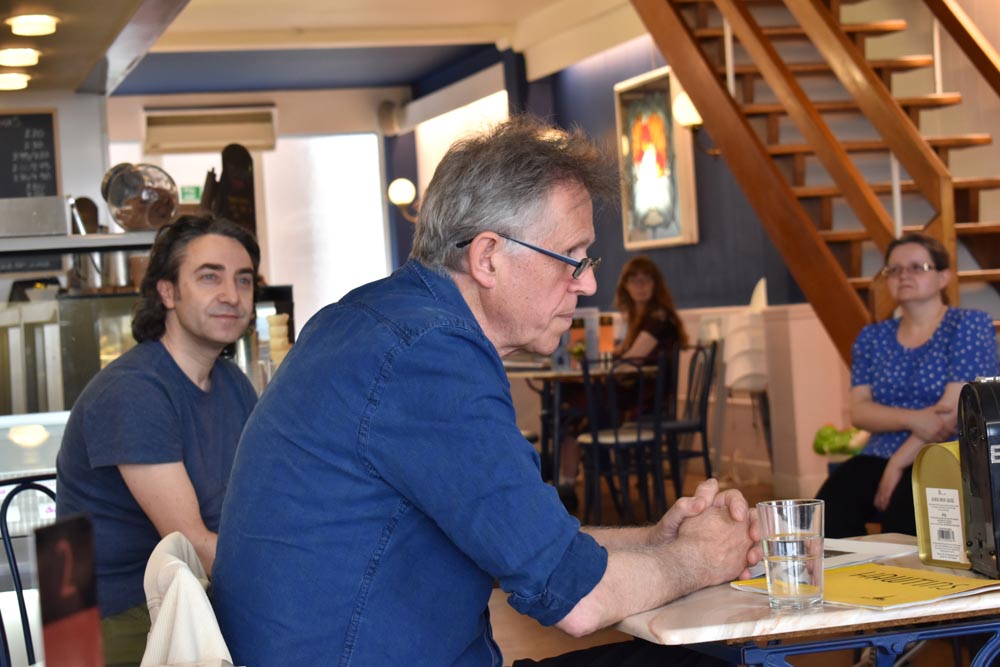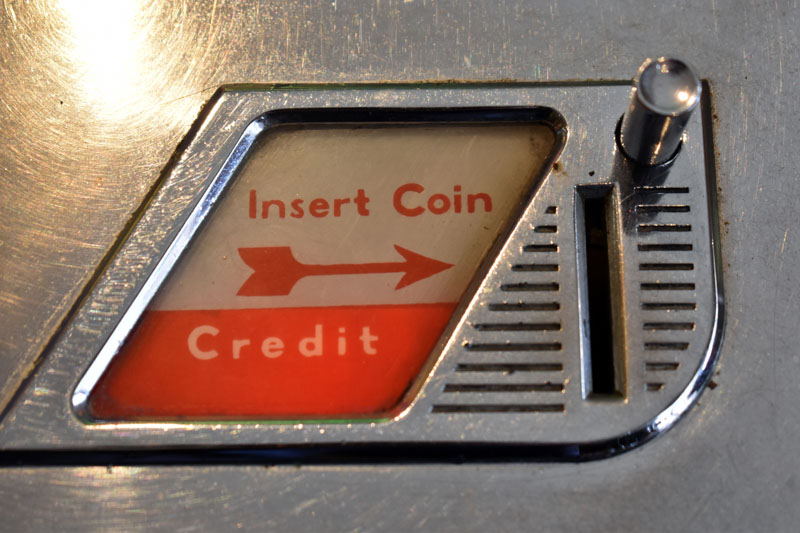Interview
Interview of Adrian Horn conducted on the 20th August 2024 at Lancaster University Library by David Murphy. In the interview the participant talks about his academic research into youth culture in the 1950s/1960s and his experience of collecting oral history recordings.

Summary
| Time | Description |
|---|---|
| 00:00:00-00:00:15 | Introduction of participant, including name. |
| 00:00:15- 00:02:21 | Interviewee discusses the reason for interview taking place, including their history in academia and the ethnological research around experiences of people as teenagers they conducted. Also discusses their critiques of theoretical frameworks. |
| 00:02:21-00:04:06 | Discusses the idea of ‘re-experiences’, and how some understandings of groups such as the Teddy Boys can overcomplicate the situation, and over-theorise the lives of teenagers. |
| 00:04:06-00:09:20 | Interviewee discusses the reason for their specific interest in jukeboxes. They discuss the need for them to specialise in their career, and the move from an interest in their design, to an interest in the social and cultural function of jukeboxes. They elaborate on this shift a bit more, discussing how the design side of jukeboxes, without looking at youth culture, was quite ‘limited’. Also begins to discuss Americanisation as a concept here, and critiques it as a major factor in youth culture. |
| 00:09:20-00:14:00 | Elaborates more on Americanisation or lack thereof, and discusses both the difference economically in America and Britain, as well as cultural differences surrounding this divide. Talks about how American influence began to take hold in the late-50s, but not before. Also states that the jukebox design from America were not available in UK, due to factors such as lack of funds and import restrictions. |
| 00:14:00- 00:17:36 | Interviewer further elaborates on Americanisation, and it being seen as superficial, with this being often linked to a superficial youth. Calls it ‘capitalism gone mad’ and had criticism both from the economic left and the conservative right. Then asked about if this has changed over time, and interviewee states that this ‘brash’ and ‘loud’ American design is still there internationally. |
| 00:17:36- 00:22:30 | Goes back to the interviewee’s research, and their research design, and states that they needed to regularly redesign and change their PhD, as they didn’t start with a hypothesis ton prove. Said that this was going against the grain in the field. Felt it was important to include a good amount of ethnography, to see how it was ‘landing’ with people. Starts to talk about jukebox locations here, and that jukeboxes were in coffee bars, but not in pubs, they weren’t necessarily associated with alcohol. |
| 00:22:30-00:24:00 | Asked about being led by the research instead of a hypothesis, and how mindful this was. States it was mindful, and that it felt just as much of a history study as a social science study. |
| 00:24:00-00:32:21 | Asked to discuss more about ‘defining teenagers’ as a concept. Interviewee states that teenagers is often seen as an invention of the 1950s, but that these concepts and criticisms have ‘always been there’, but that teenager is a very wide age range to base a culture around. Also states that the milk bar was a primarily British phenomenon in teenage culture. Talks about teenager being more of a mindset than an actual age category; more of an identity than a strict age bracket. Puts the teenager also into the working and schooling context of post-war Britain, and that physical work was much more common at a younger (teenage) age. This often-meant teenagers had a good amount of disposable income, and then the interviewee contrasts this with modern-day teenagers. |
| 00:32:21 -00:37:59 | Interviewee discusses their ethnography, and discusses the use of the North-West as a case study as it was more doable for their study. They then discuss the advertising they did to recruit participants for interviews/questionnaires. Then picked out about 10 participants for interview, and the interviewee discusses here the casual and at-home nature of these interviews, and why this was important. Finally, discusses transcribing, coding, and getting data ready for analysis/thesis writing. |
| 00:37:59 – 00:44:23 | Interviewee is asked about the importance of doing interviews in informal settings. They stated it felt like a privilege and compared it to other work they have done. They also then discussed their participants discussions of jukeboxes, and fascinations with the mechanisms of the jukebox; people were so fascinated that it was comparable to an ‘amusement park’, even if the music was ‘mundane’ with a lot of ‘novelty’ songs. People would travel to hear a particular song in a particular jukebox, where they discussed the infrastructure of this travel for young people. |
| 00:44:23-00:46:30 | Interviewee discussed that one of their participants wrote down all of these changes, and that this was a crucial period for the advancement of areas like catering and these smaller establishments. Jukeboxes also quickly grew in popularity and numbers in a few short years. |
| 00:46:30- 00:50:40 | Interviewee is asked if there was anything that surprised them in their research and they state yes. They state that they anticipated it not being as ‘quaint’ and ‘British’ as it ended up being. That there wasn’t a large-scale set of politics that sustained around this. States that this phenomenon has been ‘overhyped in a way’. Often participants had conservative views and weren’t ‘hippies’. Was also surprised about the regional differences in how jukeboxes were received and affected culture in Britain. |
| 00:50:40-00:54:36 | Interviewee is asked about how research progressed post-PhD. Interviewee states that Manchester University Press commissioned the research into a book, and that this research was popular at conferences, which may have been a factor in the book deal. Since then, the interviewee has been a talking head on TV and radio about the subject. Also, the book is popular, not in terms of sales but in terms of use in university libraries. |
| 00:54:36-01:03:21 | Interviewee elaborated more on the book, and stated they wrote another chapter on young women’s fashions of the time and wanted to cultivate a very ‘readable style’ for both the thesis and, later, the book. Also discusses the negotiations with the publisher around illustrations and the use of pictures in the book, owing to cost. Then discusses the picture of the ‘Teddy Girls’ on the front of the book and uses this to discuss the gendered way teenagers of the time are seen and remembered. Also stated that the readable style was important, as due to entering late in life, they didn’t find the readings to be written in a style that invited understanding, and that they would have liked to have seen the book go further. |
| 01:03:21- 01:07:19 | Interviewee then discusses their own personal relationship with jukeboxes in pubs, and that they now own one (used to own two). Also comments that music consumption has become more of a fragmented experience, with this making music left collective. Also discusses a love of vintage music, and the owning of a record player to play music on. |
| 01:07:19- 01:10:30 | Interviewee states that by the time that they did their research jukeboxes were massively changed anyway, and that jukeboxes had a much more wide-ranging bits of music. Also, discusses the move from jukeboxes being a piece of furniture to being within the wall, and how this may affect the way they are part of the ‘courting process’. |
| 01:10:30 – 01:17:00 | Changes in music consumption discussed, with the music in venues becoming ‘mainstream’, and that there is a lack of a generation gap compared to the 50s/60s. Contrasts this with the strong generational divide over music in the 1950s/60s. States that they don’t really ‘go near’ modern music, so it is hard to comment on this in the modern context. |
| 01:17:00 – 01:19:36 | Interviewee reflects on the interview, and that it weaves together opinion and academic ideas, discussing perception vs reality of the 1950s/60s. The interview is then drawn to a close, with the interviewee being thanked for their time and contribution. |
Transcript
00:00:00-00:00:00
To be added when available.
Keywords
Subjects: youth culture; jukeboxes; oral history; research
Related media



Supporting Documentation
More information on Adrian’s research can be found on his website.
Documentation related to the interview:
